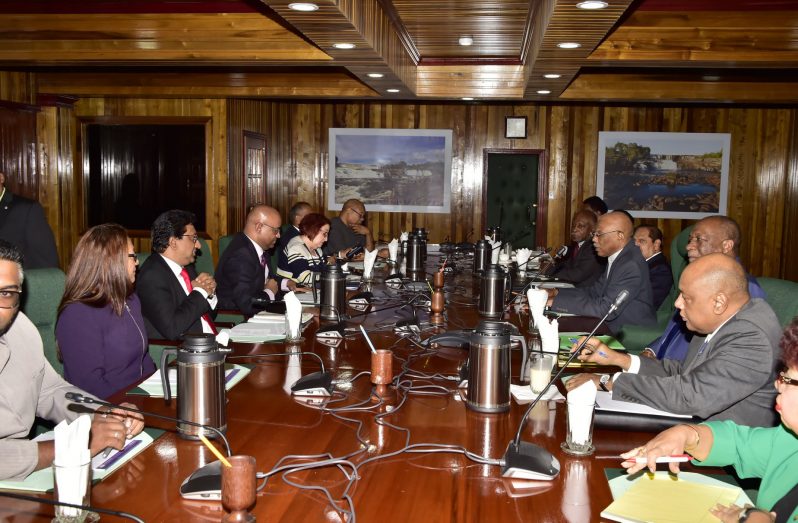…President says administration will govern without any limitations
…chief whips to engage GECOM on poll-readiness
THE A Partnership for National Unity + Alliance For Change (APNU+AFC) Government will govern the country without any limitations to its authority, President David Granger told the opposition during a high level bilateral meeting on Wednesday.
The opposition, since the controversial passage of the no-confidence motion in the National Assembly on December 21, 2018, has been attempting to strip the government of its powers and responsibilities. Initially, it called for government to resign with immediate effect, and when that did not work, it said the government should perform the duty of caretaker using Constitution as the basis of its argument.
However, Article 106(7) of the Constitution states: “notwithstanding its defeat, the government shall remain in office and they shall hold an election within three months, or such longer period as the National Assembly shall by resolution supported by not less than two-thirds of the votes of all the elected members of the National Assembly determine, and shall resign after the President takes the oath of office following the election.”
At the Ministry of the Presidency on Wednesday, the President did not mince words when he led a government delegation into a meeting with the Leader of the Opposition, Bharrat Jagdeo and bigwigs from the People’s Progressive Party/Civic (PPP/C). He made it clear that his “government is legal” and that “it must govern without any limitations on its authority.”
According to a joint statement issued by government and the opposition on Thursday, the President stated that there is no provision in the Constitution which imposes limitation on the government to perform its lawful functions. The APNU+AFC Government came to office in May, 2015.
After weeks of calling for government to resign given the outcome of the no-confidence motion, the opposition on Wednesday accepted that constitutionally the government is required to remain in office until the election of new President.
The opposition leader, hours after the meeting, told reporters that it was important for the government to remain in office. “The President made it clear that you cannot have a country without a government and we agreed with this 100 per cent, and I made it clear that our job is not to stymie the functioning of the government.”
“So where public order is concerned and public services, etc, those have to continue,” Jagdeo said.
However, Jagdeo said while he is cognisant of the importance of having a government in place, the opposition, during the meeting, recommended that the National Assembly should only be convened to decide on matters related to the conduct of elections or any other matter mutually agreed upon.
“No new legislation, we made it clear, should be initiated in the National Assembly and that the government should function more in a routine capacity in the conduct of the affairs state for the period, the 90 days. But we do not want to have a country without a government, and that is not contemplated for by our constitution.”
But this was not agreed upon by the government with the President underscoring the importance of the effective functioning of the Legislative and Executive arms of the government.
“Neither of these two important institutions, the legislative branch and the executive branch could be allowed to fail. Public services have to be delivered; public order has to be maintained and therefore the two sides, reach broad agreements on how these two institutions, the legislative branch and the executive branch, would continue to function,” the President said in a televised recording moments after the meeting.
Zooming in on Article 106 (7) of the Constitution, the President indicated that the government and the opposition, by agreement in the National Assembly, can enlarge the time beyond the 90 days contemplated by Article 106 (7) of the Constitution. The opposition has since indicated it is willing to extend the timeline, if needs be.
Another matter that came up on the agenda was the legal recourse taken by the government to challenge the vote of no-confidence, which was declared passed by Speaker of the National Assembly, Dr. Barton Scotland. The opposition requested that the legal challenges in the court be dropped but the President again made it clear that there is nothing unlawful by engaging the Court. He stated that it is lawful for the government to engage the Court to bring clarity to the provisions of Article 106 (6) and 106 (7) of the Constitution. Pending the conclusion of the legal proceedings, Parliament remains functional, President Granger stated.
Both sides have committed to work towards the expeditious conclusion of the matters engaging the attention of the court.
President Granger was accompanied by Prime Minister, Moses Nagamootoo; Vice President and Minister of Foreign Affairs, Carl Greenidge; Vice President and Minister of Public Security; Khemraj Ramjattan; Attorney General and Legal Affairs Minister, Basil Williams; Minister of State, Joseph Harmon; Minister of Natural Resources, Raphael Trotman; and Minister of Social Protection, Amna Ally. Meanwhile, the opposition leader was accompanied by Gail Teixeira, Anil Nandlall, Frank Anthony, Juan Edghill, Irfaan Ali, Pauline Sukhai and Odinga Lumumba.


.jpg)











